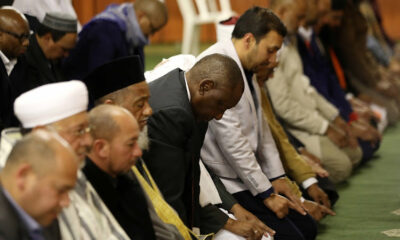
OpEds

SA needs wise choices not wishful thinking
Never has the Chinese curse or cliché, “May you live in interesting times”, been more fitting for South Africa in the aftermath of the momentous 29 May election.
One aspect which never came to pass was that the Gaza war and South African foreign policy would feature in the poll outcome. It was striking that in Cape Town, for example, home to most Muslims in South Africa, attempts to weaponise that conflict made no impression on voters.
To the contrary. On one reading, the 9% drop in support for the African National Congress to an all-time low of 19.55% – with its explicitly anti-Israel stance – was almost matched by the 9% obtained by the most pro-Israel party on the ballot, the Patriotic Alliance.
The Democratic Alliance was barely touched by any of this, and comfortably won the province with an overwhelming majority.
You didn’t need to be a political prophet to forecast that foreign policy would count for next to nothing in a poll determined by domestic crises and problems. And we now have – for the first time in three decades – a situation where we genuinely don’t know who will comprise the next government of South Africa.
As we navigate genuinely uncharted waters, it could be said that the map to hand, our Constitution, will guide us safely to calmer waters. That’s both true and untrue.
The Constitution does indeed provide us, and crucially, new members of Parliament, with a reasonably detailed roadmap. Forgive the mixture of metaphors, but of course, just as it had a Nelson Mandela in mind as head of state, the Constitution also had an implicit bias that one party would obtain a parliamentary majority. It didn’t closely contemplate the reality we’re in – a hung Parliament with no overall majority for a single party.
Of course, the Constitution tells us exactly the form and manner of electing the speaker and president. However, the timeline it prescribes – 14 days after last Sunday for Parliament to convene and elect – doesn’t allow for a lengthy bargaining period. This often lasts months, not weeks, in other democracies where multi, not single, party governments are the rule not the exception.
I’m not going to interrogate the merits and demerits of the possible arrangements, which could provide South Africa with a stable government consonant with democratic continuance, economic sensibility and genuine freedom, and equality as indeed our Constitution mandates.
But there’s one approach which does need to be headed off at the pass.
Some otherwise impressive analysts have suggested that even if, for example, a government consists in part of parties which want the Constitution junked entirely – the uMkhonto weSizwe (MK) party – or who will red ant it from within by destroying its key pillars and foundations – the Economic Freedom Fighters (EFF) – then it would be rough, but South Africa would survive.
Indeed, on this analysis, the current centrist political forces would, after such a torrid and destructive period, emerge to reclaim democracy and rebuild the economy.
I regard any such view as an extreme form of wishful thinking.
Someone said that when you introduce Hitler into an argument you’ve lost it, since his regime was such an extreme and nihilistic example of genocidal authoritarianism that it has no equal in history.
That’s true, but the Micawber approach of “hoping that something will turn up for the better” is applicable to some naivete around our situation. It’s also as misplaced here and now as it was back then in democratic Weimar Germany in 1933.
As the brilliant historian Timothy Snyder reminds us, “History does not repeat, but it does instruct.”
In his short booklet On Tyranny: Twenty Lesson from the Twentieth Century, Snyder writes, “We tend to assume that institutions will automatically maintain themselves against even the most direct attacks.”
This of course is an historic mistake, as Snyder illustrates by reminding us that institutions – courts, Constitutions, reserve banks etc – “don’t protect themselves”. And “hope as a strategy” is nothing new, as Nazi Germany ominously reminds us.
Snyder quotes at length from a leading newspaper for German Jews published on 3 February 1933, days after Hitler was installed as Reich chancellor due to backroom machinations, not a parliamentary outright majority. It read in part:
“We do not subscribe to the view that Mr Hitler and his friends, now finally in possession of the power they have so long desired, will implement the proposals circulating in Nazi newspapers. They will not suddenly deprive German Jews of their constitutional rights, nor enclose them in ghettos, nor subject them to murderous impulses of the mob. They cannot do this because a number of crucial factors hold powers in check, and they clearly do not want to go down this road.”
While Nazi Germany was darkly unique in history, the entirely reasonable view of people then is based on a mistake which equally reasonable people make now. As Snyder reminds us, “The mistake is to assume that rulers who came to power through institutions cannot change or destroy those very institutions, even when that’s exactly what they have announced they will do.”
Jacob Zuma’s MK party wants to dismantle the Constitution entirely and strip the judiciary of its testing power over parliamentary legislation and worse. The EFF has advised – via its leader or “commander in chief” – that it wants “to slit the throat of whiteness”; destroy the independence of the Reserve Bank – and with it our currency via runaway inflation; expropriate private property; and nationalise industry.
Place either or both such parties into the new government of South Africa, and you can see the future plainly.
Our bond rate now is already about 20% for a 20-year bond, given future uncertainties. Confidently, you can predict it will be, under such a prospectus, impossible to raise any funding at all for these economically ruinous programmes.
It’s entirely correct to say that this is hardly a replica of Nazi Germany, but it’s a pretty good facsimile of Hugo Chávez’s Venezuela – and the late Chávez is the explicit role model for Julius Malema. Venezuela was once upon a time the most successful economy in South America. Today, its citizens are reduced to beggary and its currency is debauched.
Like South Africa, it had an authoritarian past, but just before Chávez and his successor, Nicolás Maduro, it was a robust democracy. Since their ascent, it has become a sham democracy, an authoritarian one-party state in form and substance, if not in name.
Last week’s election presents South Africa and its new Parliament with great opportunity and a prospect for renewal. But the opposite is also true: it’s also a moment of great peril. Let’s hope there’s enough common wisdom and deft leadership to choose the right path.
And given the arithmetic of the new Parliament, this is the one time when the wisdom of United States baseball icon Yogi Berra doesn’t apply. He said, “When you come to a fork in the road, take it.”
The choices made, or not made, in the next 14 days will determine our future for a very long time to come.
- Tony Leon is the founding leader of the Democratic Alliance, the longest serving leader of the official opposition in Parliament since the advent of democracy, and a former ambassador. He’s the chairperson of a communications company.









Jessica
June 9, 2024 at 11:07 am
In the end, literally all public and private institutions will in principle be usurped by a Doomsday Coalition. Tribal Africanism and international socialism in cahoots will only push the country over the precipice.